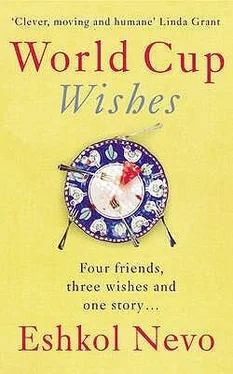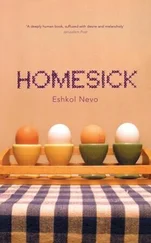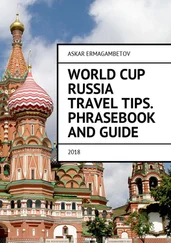I’m interested. And … I’d be very happy to read them, I said, remembering the only piece she’d read in the workshop. It was a secular description of Yom Kippur eve in a Jerusalem synagogue, and there was something so lucid and unpretentious about her words that even the tutor had no criticism when she’d finished reading.
Read them? No, no (a small smile, a large gesture of dismissal), thank you. Of course not, I’m a conservative girl. I don’t do things like that on the first date. Besides, sometimes there’s power in keeping things to yourself, don’t you think?
I liked the timid girl more every minute. There was something provocative in the contradiction between how withdrawn she was in the workshop and how open she was with me. She never tried to charm or impress me while we were talking, and that in itself was charming and impressive. So impressive that I can’t remember a single detail about the café we were in. Not the menu. Not the waitress. Not what I ordered. Just her lovely shoulders and her hands constantly speaking to me.
When she finally grew silent and put her eloquent hands on the table, I wanted very much to stroke them, to stroke her forearm from her elbow to her wrist. Not since Ya’ara had spoken to me in the campus cafeteria four years earlier had I felt such an intense need to touch a girl. To know her. To resolve her contradictions.
But I stopped myself. I didn’t pick up the lacy gauntlet she’d thrown down by calling a work meeting a ‘first date’, and I didn’t ask her out on a second one.
Only two months were left till the World Cup final and I couldn’t allow myself to get caught up in that maelstrom called love.
I promised myself that the day after the final, I’d call her, and as we stood at the door of the café, I gave her a long kiss goodbye on the part of her cheek closest to her mouth.
Good luck with your manuscript, she said, tenting her hands.
Thank you, I said, and tented my hands too.
She walked away towards the car park, and I wanted to run after her, grab her by her shirt and promise she wouldn’t lose me.
But at that moment, my desire to complete the wonderful symmetry — however suspicious it might sound — was stronger.
*
Two months seemed enough time to publish a book: to copy-edit, typeset, design a cover. But during the first talks I had with publishers, I discovered that their pace was slightly different from that of the Efroni Printing House.
Send the manuscript, you’ll receive an answer within a year, the first publisher I contacted told me.
A negative answer within nine months, a positive one — up to two years, the second place told me.
What is the book about? a senior editor at the third publishers asked.
It’s about a group of guys, friends who … I began to explain.
Men friends?! she interrupted me. Men aren’t in these days, but send it, you never know.
Two weeks were left before the opening of the World Cup, and only a month and a half till the final.
With a heavy heart, I printed out the manuscript, put it into a transparent plastic bag and drove to Haifa.
I DROVE SLOWLY, very slowly. I thought it would be quite stupid for me to die in an accident when I was so close to making Ofir’s dream come true.
When you drive slowly, you notice the different shades of green in the fields between Netanya and Hadera, and the flocks of birds flying in rapid-shifting formations over the Maagan Michael fish ponds, and the new neighbourhood going up next to Neveh Yam, which has the water park with the the bluest slides in the country, and as you slide down the slope of your memories, other drives on this road — officially known as Road No. 2, but it’s number one in your life — float to the surface. Like the time Churchill helped you move your things to the apartment in Tel Aviv, following you in his Beetle, and a little past Wingate he called your mobile and said he was thirsty, did you have anything in the car to drink, and you said there was mineral water, but you didn’t feel like stopping now, so he drove up alongside the car, you passed him the bottle through the window, he took a few sips and returned it to you, driving the entire time. And there were those late Saturday night drives back from Haifa listening to the army radio station, your heart fluttering with the hope that a gorgeous girl soldier would be standing at the hitchhikers’ stop and you would pull over for her and ‘fall for her instantly’, like the words of the Eran Tzur song. Then there was the driver who gave you a ride to Gelilot when you yourself were a soldier, and he kept nodding off, until he actually fell asleep near the Havazelet junction and you lunged to grab the wheel hard and saved both your lives, and he thanked you effusively and took your address so he could send you an invitation for a free meal in his restaurant in Ashdod, which he hasn’t sent to this day. And there’s that enormous chair, God’s chair, on the cliff at Atlit. Once, driving past it, Ya’ara asked if you knew who had put it there and why, and you were embarrassed to admit that you didn’t, and she suggested that on the way back you both climb up and check it out, and if it isn’t a monument to the fallen or some other sad thing, you can have sex there, because unusual places turn her on, but on the way back, she fell asleep and her cheeks were so soft that you didn’t have the heart to wake her. And now’s the moment the road emerges from between the limestone hills and you can see the sea, not a narrow strip but the entire expanse of blue, the place where you always wanted to forget all your plans, all your important goals, and simply pull onto the hard shoulder, strip and run into the waves. Even on the way to Ilana’s funeral, you recall, Ofir’s glance occasionally moved to the left, and he said, look at the colour of the sea today, but you didn’t pull up because Maria’s jagged sobs were heartbreaking, and who goes to the beach on the way to a funeral anyway. Even now, you don’t pull up, you keep driving straight, because you must, you simply must talk to your father, and he closes at five on the dot on Sundays because he thinks the printing presses are more likely to break down on Sundays after having rested on Saturday, so you actually have less than an hour. And if you’re late, you’ll lose a day’s work. And every day counts, because the World Cup is getting closer.
*
When I went into the printing house, I looked around for my mother, out of habit.
For twenty-five years, she had worked alongside her husband, handling the pre-printing stage: photography, montage, plates. When business was good, there were four people working under her, but in recent years, the whole process had become computerised, making her and the four employees redundant. At first, my father tried to hold out against the change and delayed buying the modern equipment (perhaps he already knew in his heart what would happen?), but when long-time clients threatened to go elsewhere if he didn’t update his operation, Efroni finally entered into the new, less romantic, era of printing, and one day, a little before six in the evening, closing time since forever, my mother got up from her chair and began filling a cardboard box she’d brought to work with all the optimistic little signs that had always stood on her desk.
AN APPLE A DAY KEEPS THE DOCTOR AWAY
SMILE — IT’S A CURVE THAT MAKES EVERYTHING STRAIGHT
SMILE AND THE WORLD WILL SMILE BACK AT YOU
IN GOD WE TRUST. ALL OTHERS PAY CASH
My father watched her in silence. When she took the design books and magazines from the shelf behind her and put them into the box too, he added a raised eyebrow to his silence. And when she began to remove the series of pictures of Princess Diana (with Harry, with William, with both sons together), he could no longer control himself and cleared his throat.
Читать дальше












